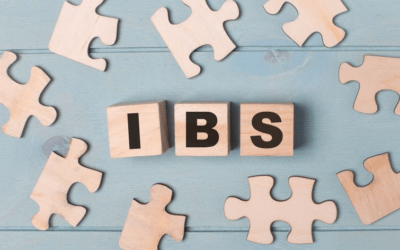Irritable bowel syndrome (IBS) is a common digestive disorder marked by abdominal pain, bloating, constipation, and diarrhoea. While its exact cause remains elusive, research suggests a strong link between ultra-processed foods (UPFs) and IBS symptoms. If you’re struggling with IBS, understanding this connection can be crucial in managing your symptoms and improving your quality of life.
What are ultra-processed foods (UPFs)?
Imagine food on a spectrum. At one end, you have whole, unprocessed foods like fruits, vegetables and whole grains. These are natural raw ingredients, packed with a whole range of nutrients and fibre. On the other end lie UPFs – heavily manipulated products with little resemblance to their original ingredients and very much depleted of many nutrients. Think instant noodles, frozen pizza, sugary drinks, processed meats and packaged snacks. These are all examples of everyday UPFs.
UPFs are often loaded with:
- Unhealthy fats: Saturated and trans fats can irritate the gut and worsen IBS symptoms
- Added sugars: These can disrupt gut bacteria and contribute to inflammation
- Artificial sweeteners: While sugar-free, some sweeteners may have unintended gut effects and often contain FODMAPs
- Refined carbohydrates: Lacking fibre, these foods can lead to blood sugar spikes and digestive discomfort, including IBS symptoms
- Emulsifiers and additives: Their potential impact on gut health is still under investigation, but some evidence suggests they may play a role in IBS symptoms
The gut-UPF connection:
The gut is an environment which contains trillions of bacteria, forming a complex ecosystem called the gut microbiome. This microbiome plays a vital role in digestion, immunity and overall health. UPFs can disrupt this delicate balance in several ways:
- Reduced fibre: Fibre nourishes gut bacteria. UPFs are typically low in fibre, depriving these beneficial microbes of their fuel source
- Altered gut microbiota: Studies suggest UPFs can promote the growth of harmful bacteria while reducing beneficial ones, leading to imbalances linked to IBS symptoms
- Inflammation: Ingredients like unhealthy fats and added sugars can trigger inflammation in the gut, worsening IBS symptoms
Managing IBS with a UPF-conscious diet:
While eliminating UPFs entirely isn’t always realistic in our modern world, being mindful of your intake can significantly impact your IBS. Here are some tips:
- Prioritize whole, unprocessed foods: Fill your plate with fruits, vegetables, whole grains, lean proteins and healthy fats
- Limit processed meats and sugary drinks: Opt for fresh meat and water instead
- Read food labels: Pay attention to ingredients and avoid products with high levels of unhealthy fats, added sugars and artificial additives
- Cook more at home: This gives you control over the ingredients and portion sizes. Making tasty dishes from raw ingredients can often be more economical too
- Experiment with FODMAPs: This dietary approach can help identify and avoid specific fermentable carbohydrates that trigger your IBS symptoms
- Consider a personalized approach: Consult an IBS Dietitian for guidance tailored to your individual needs and triggers
Remember
- Listen to your body: Pay attention to how certain foods affect you and adjust your diet accordingly
- Stress management: Chronic stress can worsen IBS symptoms. Practice relaxation techniques like yoga or meditation
- Seek professional help: If your symptoms are severe or you’re struggling to manage them, consult your GP or Dietitian
Conclusion
Understanding the link between ultra-processed foods and IBS symptoms and making informed dietary and lifestyle choices, will pay dividends. By taking control of your gut health you’ll experience fewer flare ups and generally feel that you have more energy and zest for life. Remember, small changes can make a big difference! If you’re interested in learning more about UPFs and where you can find them in your diet, Tim Spectre’s research this podcast is worth a listen.
Change your life in just three sessions
Need help to manage your IBS symptoms? I’m based in Cardiff, but work with IBS sufferers across the UK through online sessions. The vast majority of my clients have found that only three sessions are needed before they feel confident to move forward on their own. I will send you booklets, which have an extensive list of all the foods you can eat on the low FODMAP diet. I’m available for advice and support between sessions. Find out more about my IBS symptoms relief package. I offer a free initial telephone call for you to decide whether the low FODMAP diet is right for you. So give me a call or fill out the contact form.
Many of my clients say that working with a specialist IBS dietitian has been life-changing, and are finally managing to live more comfortable lives.
Read about previous client experiences and to help you decide it this is the right approach for you, see my webpage about IBS treatment.
Disclaimer: This blog is for informational purposes only and does not substitute for professional medical advice. Please consult your healthcare provider for personalised diagnosis and treatment of IBS




